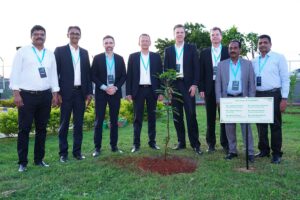1st Indian-German Water Partnership Day in Bangalore
Experts of the Indian and German water industry discuss the challenges and opportunities for cooperation in the Indian water sector at 22 October, 2013.
„German Solutions to Indian Challenges“ is the central theme of the event where the participants will examine the current situation of the Indian water market and discuss the capital expenditure requirements and technical approaches to develop a sustainable water management.
Oral presentations and panel discussions
High-ranking guests from Germany and India will open the event. The German Consul General to Bangalore, Jörn Rohde will welcome the persons present. Afterwards panels of wellknown speakers from industry, research and politics will discuss the following focal subjects:
- Challenges in monitoring the drinking water quality in urban and rural areas
- Treatment of process and waste water: efficient water use, energy efficiency and analytical monitoring
- Prevention of water pollution: sustainable solutions for municipal waste water and storm water management
Together with several members GWP will also be at a joint booth at IFAT India in Mumbai from 24-26 October. On 25 October, GWP will host a forum with oral presentations under the headline „German Solutions to Indian Challenges“ at the fair.
Exhibition and networking
Beside the discussions, the Indian and German participants will find the chance to talk to each other, cultivate contacts and get detailed information on the products and services of the GWP members and other companies and institutions at the exhibition.
Background information
India s water management faces huge challenges: the high demand of water contrasts starkly with the poor supply infrastructure. Though India possesses only four percent of the global fresh water resources it has to provide drinking water for 16 percent of the world population. Strong population growth together with exploding economic growth further aggravates the situation. India s agriculture is the biggest water consumer, using up about eighty percent.
The situation on the waste water sector is just as difficult: round about two thirds of the total amount of waste water flow back into the water cycle without any treatment. The reasons are the low capacities of the sewage treatment plants and a fragmentary sewage system.
India has set itself the goal of increasing the efficiency of water use by five percent by 2017. There are several approaches and measures to reach this goal.
For instance the new governmental draft of the National Water Policy intends to treat water as a commodity. The access to drinking water shall become easier while at the same time directives will be issued stipulating sustainable and careful use of the water resources. Further, the draft includes increasing the water prices in order to push ahead with the expansion of the water infrastructure. So far, the tariffs are kept artificially low and cover only 30 to 35 percent of the expenditure for maintenance and operation and also don t stimulate the consumers to save water. In the end this leads to wasting of water and significantly higher cost.
Source: German Water Partnership e.V.







